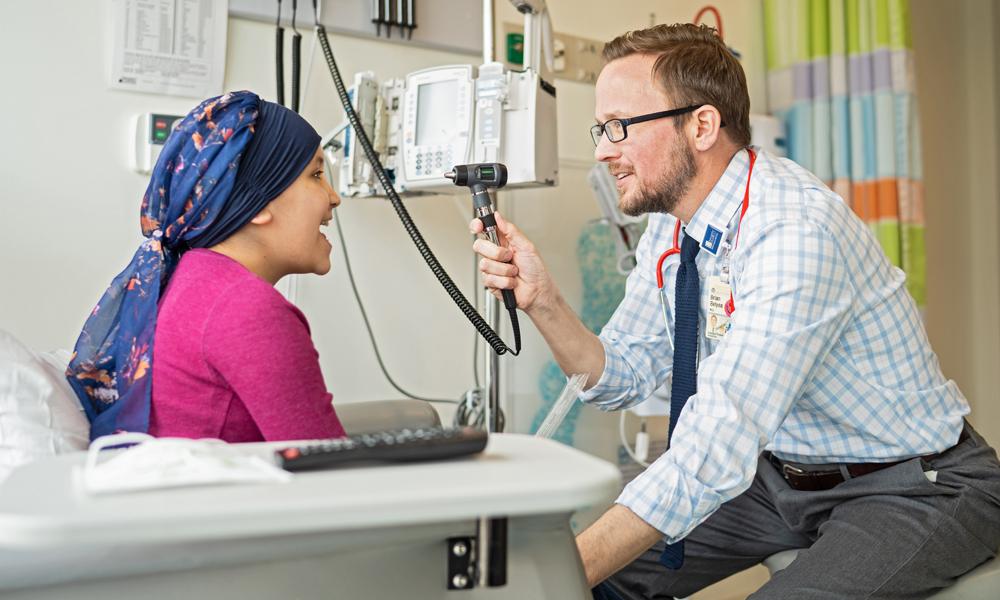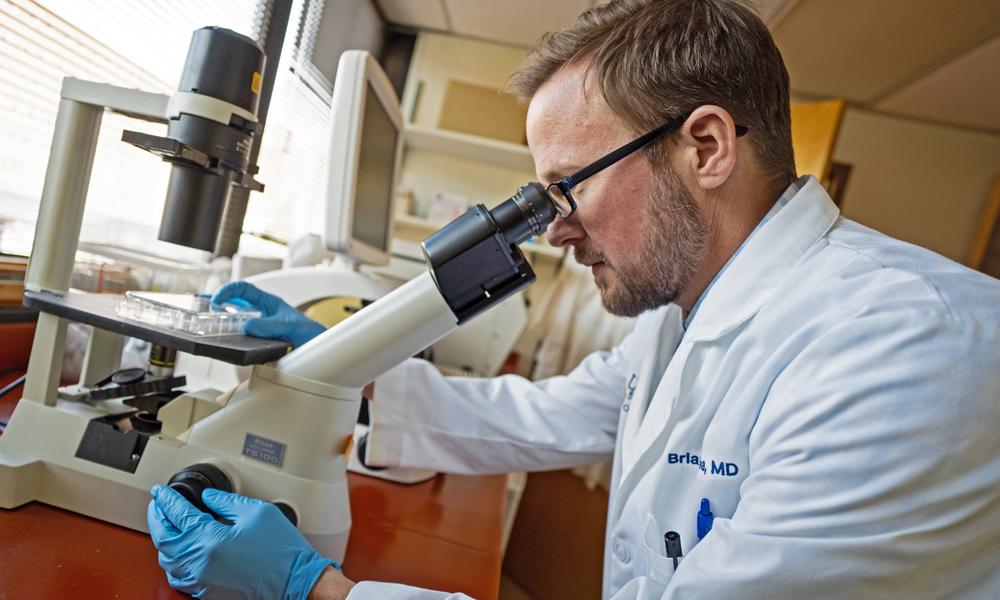Leading the fight
Pediatric oncologist takes on childhood cancer in the lab and by the bed
Health and Behavior
SUMMARY: Dr. Brian Belyea ('00) is a researcher and physician at UVA Children's Hospital, which received a $300,000 grant in the fall of 2019 to continue the fight against pediatric cancer. Belyea was named to the 2019-20 Best Doctors in America list and is regarded for his bedside manner.
By Jim Heffernan (’96, ’17M)
For as long as he can remember, Brian Belyea (’00) wanted to be a doctor. “I like to tell people, ‘I was pre-med in preschool,’” he said.
When it came time to choose a college, Belyea surprised many of his friends and family members by picking JMU. “When I toured here, it just felt good,” he said. “It felt right. I couldn’t put my finger on exactly what it was. But for four years, I reaped the benefits of that decision.”
At the time, JMU’s pre-med program was relatively small and not widely known. “But every year, students from JMU were getting into medical school—good medical schools,” he said. “I felt this was the right place for me to be successful in achieving that goal.”
A chemistry major, Belyea got involved with the pre-med honor society, Alpha Epsilon Delta, serving as vice president of the JMU chapter in his junior year and president in his senior year. He also volunteered at Rockingham Memorial Hospital, leading a program called Helping Hands, in which students helped feed some of the patients.
“There were a lot of extracurricular opportunities at JMU,” he said. “Plus, my science classes were great. I got a great education.”
Belyea had always planned to return to his hometown of Mount Jackson, Virginia, after medical school to practice as a pediatrician. But during his residency, he did a monthlong rotation in the oncology unit at UVA Children’s Hospital.
“I fell in love with multiple aspects of the field, but most of all the patients. They were these amazing children who, through no fault of their own, had these life-threatening conditions. The strength and resiliency they showed, and the relationships you make with them, their parents and siblings … I wanted to be a part of that.”
His oncology training led him to Duke University, where he was introduced to research. “My research mentor had this sign on her door that said, ‘75% of children with cancer are cured.’ She said to me, ‘If you do oncology and take care of kids, you will deliver that 75% cure rate. But if you do research, you might help improve on that.’ What she said to me that day never left me.”
Today, Belyea is a pediatric oncologist at UVA Children’s Hospital. He spends about 75% of his time in the lab researching B-Cell Acute Lymphoblastic Leukemia, the most common type of cancer in children. He is especially interested in epigenetics—controlling for factors other than a person’s DNA.

|
In September 2019, the hospital received a $300,000 grant from Hyundai Hope on Wheels, a nonprofit organization supported by the car maker and its U.S. dealers, to continue the fight against pediatric cancer. Belyea was presented with the Hyundai Scholar Hope Award, one of 52 doctor-researchers to be recognized nationwide. At a time when public funds for pediatric cancer research are limited, he said, a private research grant like Hyundai’s is “huge.”
Belyea’s research helps inform his work as a physician. He said the keys to being a good doctor are “staying humble and always keeping an open mind.”
“I’m trying to learn each and every day,” he said, “and I trust patients and families to tell me what’s going on, as opposed to vice versa.”
Belyea was named to the 2019-20 Best Doctors in America list and has twice been recognized by his patients for his bedside manner.
In February, he returned to JMU to speak with organizers of the annual MadiTHON event benefiting the Children’s Miracle Network. The group included some of his former patients and their families.
“All of us pediatric oncologists, we draw a lot of strength from the kids we’ve helped,” Belyea said. “Part of our profession, unfortunately, involves going to funerals. After a while, I realized that I also need to make sure to go to the life celebrations, the graduations and events like this one, where I get to see (former) patients who are doing great. That’s the most rewarding part.”

